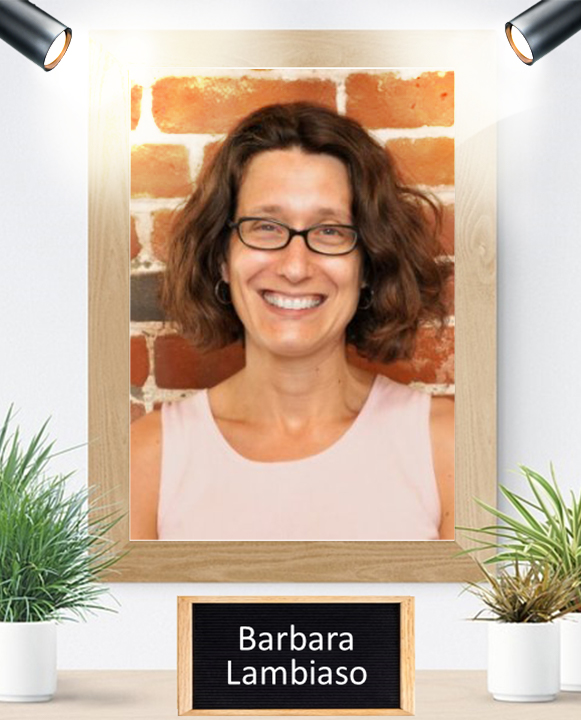Insights
NICHQ Employee Spotlight:
Barbara Lambiaso
In celebration of over 20 years improving health outcomes for children, we're sharing insights, memories and goals from the NICHQ team.
 Full name and title: Barbara Lambiaso, Project Manager
Full name and title: Barbara Lambiaso, Project Manager
Years with NICHQ: Four
How has your background/experiences led you to join a national children’s health organization?
I came to NICHQ with a background in social work and public health, with expertise in project management and health communications. I have a passion for exploring and addressing the root causes of disparities in health and social justice. NICHQ offers me the opportunity to work with my passion and start at the foundation of our communities, working to change the systems that impact the lives of children and families. I value the opportunity to contribute to NICHQ's portfolio of programs tackle systems change to focus on the social determinants that are at the root of disparities in the lived experiences of so many children and families.
Favorite memory from a NICHQ project:
I have had the greatest opportunity to work with the Sickle Cell Disease Treatment Demonstration Regional Collaborative Program (SCDTDRCP) since my start with NICHQ four years ago. I can not say enough about the how inspiring the grantees and experts I work with are in their everyday commitment to serve children and adults with sickle cell disease (SCD) and provide the best care for the best outcomes. Additionally, it has been my privilege to connect and learn from individuals with SCD, caregivers and community-based organization about their experiences and the strength and resilience it takes to face this rare disease head on. My favorite project with this initiative was working with an amazing team of colleagues at NICHQ to develop and produce the 2017 SCDTDP Report to Congress and the companion materials to inform and spread best practices for care across SCD clinics and programs across the country. This was a big lift, but our project team was up to the challenge, being accountable to a broad and collaborative scope of work that included strong stakeholder engagement. NICHQ supported this team with resources and leadership to ensure the completion and dissemination of exemplary products that highlighted the impact of this important program to Congress for continued funding and to the field for continued engagement.
Biggest lesson-learned when working on a quality improvement project:
The biggest lesson I have learned with quality improvement projects is the importance of spread and dissemination. One of my favorite projects was working with the Collaborative Improvement and Innovation Network to Reduce Infant Mortality (IM CoIIN) National Program to develop an online, interactive toolkit to spread the best practices and lessons learned captured over the five years of this project. The Infant Mortality Prevention Toolkit is a legacy to a national program and the teams across the country that engaged in this challenging and rewarding work to inform the field moving forward. I had the opportunity to interview state teams across the country about the strategies they implemented through quality improvement cycles that helped reduce the nations infant mortality rate over the course of the IM CoIIN program. These people were committed, the work was complex, and their stories were and still are inspiring. The toolkit continues to spread on-the-ground tested approaches for reducing infant mortality beyond the lifecycle of the IM CoIIN National Program. Quality improvement takes time and effort, and this toolkit is able to share information so that programs can continue to “steal shamelessly” and avoid reinventing the wheel on their road to improvement.
Favorite NICHQ moment:
One of my favorite memories from NICHQ was when the full staff volunteered together for an afternoon with Cradles to Crayons Giving Factory in Boston. Cradles to Crayons is a non-profit that harnesses the power of contributions and volunteerism to provide children with essential items they need, in a manner with compassion, dignity and respect. This event was the perfect fit for NICHQ staff to engage in our mission in a more granular way than our day to day focus on systemic and institutional change. It was an amazing bonding experience for our staff to take time together to make a direct impact on the lives and well-being of children in our Greater Boston area. At the same time, NICHQ had several remote employees that engaged in similar activities in their communities so that we all could benefit from the fresh perspective volunteering provided. This moment illustrates NICHQ's commitment to nurturing staff to connect with each other and our mission in broader ways.
What are you most proud of from your time with NICHQ and what are your goals for NICHQ’s future?
I look forward to NICHQ growing and taking a lead in the health equity and anti-racism change that needs to occur across our nation. NICHQ has a real opportunity to step up beyond disseminating strategies and lessons learned to ‘walk the talk’ and model what it means to tackle implicit bias individually, organizationally and systemically. I am proud to be part of an organization that not only supports its employees to examine implicit bias in our own work and lives, but is also willing to step up to the plate to lead this work with humility and in partnership with leaders, families and communities most impacted by systemic and institutional racism.
